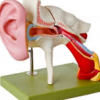Dr. Andrew Thamboo, MD, FRCSC, MHSc.,Otolaryngologist
Understanding Chronic Rhinosinusitis (CRS)
Duration: 4 minutes and 4 seconds
CRS stands for chronic rhinosinusitis. It's a condition that lasts for greater than 12 weeks and it has multiple different symptoms such as facial pain, pressure, discharge or nasal obstruction, and a loss of smell. To make a diagnosis you need to have two of these symptoms in conjunction with objective findings, which can be found on endoscopy or CT scan.
The sinus cavities can be obstructed by some type of inflammation secondary to a virus or bacteria or due to an allergen or some other type of irritant. Sometimes it can be more immunological where the patient's immune system seems to be weak. This can create an inflammatory system resulting in inflammation that blocks the sinuses leading to symptoms. Sometimes it can be genetic and sometimes it's really just unclear to what’s causing the chronic sinus disease.
In terms of treatment, we try medical treatment first, which begins with using nasal steroids in a saline solution. This is done by using a nasal rinse where the steroid is put directly in the saline solution. Washing the nasal cavity before applying other medications such as sprays, also clears away mucus and allows nasal medications to be absorbed better. Some patients may require antibiotics.
When it comes to subtyping chronic sinus disease you may hear something called polyps to no polyps. Essentially, patients tend to have either chronic sinus disease with polyps or chronic disease without nasal polyps. Nasal polyps are abnormal growths of tissue that can become large enough and numerous enough to clog the sinuses and nasal passageway, causing symptoms such as congestion/nasal blockage and a decreased sense of smell. The people with the nasal polyps tend to have a better response to nasal steroids, versus those who don't have polyps.
Those who don’t have nasal polyps tend to have more of an inflammatory component to their disease that typically responds to antibiotics, particularly if it's more bacterial based. In this situation, your health care provider will probably ask you to try a steroid nasal spray initially, as sprays are easy to use. Although sprays don’t reach deep into the sinus cavities, they reduce swelling in the nasal passages and help open up the areas that help the sinuses drain.
People who have environmental allergies as a contributing factor to their sinus problems may be able to change things in their home or work conditions to reduce exposure to the specific allergens that bother them.
If you feel you may have chronic rhinosinusitis and would like to be assessed for the condition, please visit your local health care provider or ENT specialist.
Presenter: Dr. Andrew Thamboo, Otolaryngologist, Vancouver, BC
Local Practitioners: Otolaryngologist


